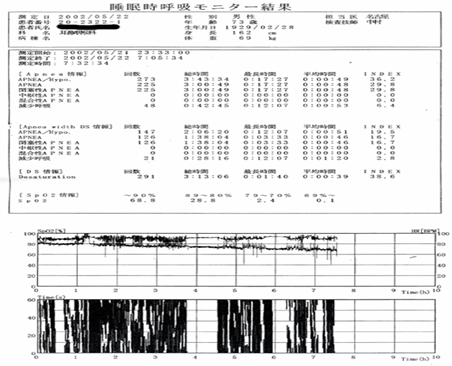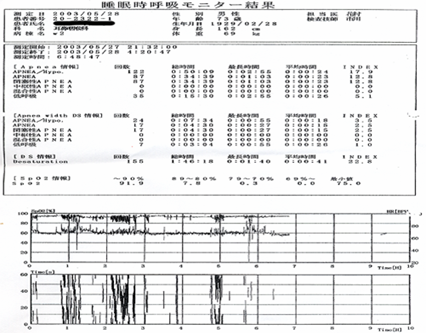Snoring / Sleep Apnea / Mouth Breathing
Snoring

Mr. C, Japan
The frequent mouth ulcers and snoring I had before having improved. People around me have noticed I look younger. Besides the external changes, I feel changes in my body too. I use the Patakara every day while doing my facial muscle exercises.
Mr. Fuminoto, 55 years old
More shocking than hearing my own astounding snoring on the tape my wife recorded was the fact that I had sleep apnea. I started diligently doing the Patakara oral muscle exercises for 15 minutes before meals every day. Within just two weeks, my wife told me that the gasping snoring had improved significantly. By the third week, I had lost 2 kg, and people even told me my face looked firmer. Now, even my wife has started doing the Patakara oral exercises with the goal of slimming her face.
Ms. Yachi, 37 years old
Because my father's snoring improved after he started the Patakara oral exercises, I also started doing them with aesthetic goals in mind. At first, doing it twice a day had no effect, so I changed to doing the open-close and rope-twist motions four or five times a day. After one month, my friends asked me, "What kind of diet are you on?". After about half a year, I realized I woke up feeling more refreshed in the mornings, and my severe winter-time hand cracking was resolved. Wondering what new change will come next has become a source of enjoyment for me.
Pchome Testimonarial
User experience sharing from the PChome platform
Liu K. Y.:
Hello, I have been using it for three weeks now and have noticed that my facial skin has become more refined, and I snore much less during sleep. The results are quite good. However, I haven’t seen any improvement in skin sagging yet.
2023/07/23 - 16:05
I would like to ask if wearing this could potentially improve skin sagging? Also, what about nasolabial folds? How long does it usually take to see results? Thank you.
2023/07/23 - 16:05
Also, sometimes when I watch TV, I wear it for 30-40 minutes. Is that okay? Are there any time restrictions for usage? Thank you.
2023/07/23 - 16:06
Sorry for just seeing your message now. Wearing it for 30-40 minutes is okay, as long as it doesn’t feel sore. Improvement in skin sagging depends on individual physique. It is recommended to also increase protein intake while using this training. Nasolabial folds require a longer time to show improvement.
Read 2023/08/01 - 16:33
Did you do facial stretching exercises before finishing? Stretching is also very important to enhance the results.
Read 2023/08/01 - 17:12
Liu K. Y.:
I didn’t do stretching exercises. So stretching is necessary too! Is there a video tutorial available? Lately, I’ve been feeling that my face is becoming tighter, so the results are showing. It might just take a bit longer for the nasolabial folds to improve with training.
Thank you, I will make sure to consume more protein.
2023/08/01 - 17:27
OSA patient
The Story of a Sleep Apnea Patient
This is the examination report for a 70-year-old male patient who underwent testing for obstructive sleep apnea. Eleven months ago, concerned that he might stop breathing during sleep and wanting to understand his condition, this patient underwent a three-day, two-night hospital examination. He was diagnosed with sleep apnea (OSA), and the doctor recommended using n-CPAP. However, sleeping with the machine was very difficult, and he was completely unable to fall asleep, so he eventually gave up on it.
He avoided addressing the issue for about a year. Still worried about his condition, he consulted an internal medicine doctor. This doctor suggested trying a dental appliance (sleep splint) and referred him to a dentist. It turned out that he had no teeth in his lower jaw, making it impossible to fit the splint.
Finally, he was referred to Dr. Hosokawa. Dr. Hosokawa recommended using the oral muscle trainer "Patakara". After using Patakara for five weeks, following the internal medicine doctor's advice from a year prior, he underwent another three-day, two-night hospital examination. The results after use are shown in the chart. The examination results show a very significant improvement in the duration of breathing pauses during sleep and the oxygen saturation level in his blood.


250mmHg Blood Pressure & Sleep Apnea Normalized with Patakara Exercise
Troublesome Dizziness and Headache
I was diagnosed with hypertension about ten years ago. I often felt a tightness in the muscles of my neck while making deliveries, which would then lead to headaches. Sometimes I would suddenly feel dizzy while working standing up. After a doctor diagnosed me with high blood pressure, I started taking antihypertensive medication. My usual blood pressure was around 200 mmHg systolic and 120 mmHg diastolic. When I had headaches, my systolic blood pressure sometimes reached 250 mmHg.
Starting about five or six years ago, I began experiencing symptoms of arrhythmia, such as a sudden tightness in my chest and a sensation of my pulse stopping. Medication improved the chest tightness, but the sensation of my pulse stopping persisted. Because my heart condition was so unstable, doctors were unwilling to perform cataract surgery on me. As a result, the cataracts worsened until everything I saw appeared as if covered by a white film.
The Dentist's Recommendation
Around the end of 1999 (Heisei 11), a dentist friend told me, "There's a device that is very good for improving snoring," and recommended I try it. My snoring was very severe. Once, when I was hospitalized for dizziness, my roommate complained that my snoring was too loud and prevented her from sleeping, so I had to move to a private room.
After starting to use the Patakara, I used it for 2-3 minutes each time, morning, noon, and evening, and found additional times to use it, so I ended up using it about 5-6 times a day. At first, the area around my mouth felt sore, but I got used to it after a while. When doing the Patakara exercises, I would prepare a towel because sometimes saliva would flow out.
High Blood Pressure and Arrhythmia Disappeared After Two Months
I started using the Patakara hoping to improve my snoring, but the first effects I noticed were actually on my arrhythmia and high blood pressure. About two months after starting the Patakara exercises, I went back to the hospital for a routine check of my blood pressure and arrhythmia. The doctor told me that there was no more arrhythmia or hypertension and that I no longer needed medication. I also felt that even without medication, the chest pain and sensation of my pulse stopping did not recur. My blood pressure became around 130 mmHg systolic and 100 mmHg diastolic, and I no longer experienced headaches or dizziness. Because my blood pressure was well controlled, the doctor decided to perform cataract surgery.
The Number of Nighttime Trips to the Bathroom Decreased
My family told me that after about three months of use, my snoring sound had decreased significantly, and episodes of breathing cessation (apnea) no longer occurred. What surprised me the most was that I used to have to get up to use the bathroom 4-5 times every night, but now it was down to about 2 times.
My situation involved a mix of various symptoms. Doctors had said it was difficult to treat each symptom individually, but after using the Patakara, all the symptoms seemed to start improving. I will continue to use the Patakara to maintain the health I have thankfully regained.
Dr. Akihiro's Comments
Ms. Susaki's snoring was caused by the weakening of the tongue muscle group. When the tongue and the muscles supporting it weaken, the base of the tongue sinks into the airway while sleeping on one's back, causing the airway to narrow. This obstructs the inflow of air, making snoring likely. The Patakara exercises not only train the muscles around the mouth but also the tongue and the supporting muscle group inside the oral cavity. This strengthens lip closure force and prevents the base of the tongue from sinking during sleep, improving snoring.
Sleep apnea, like snoring, is caused by the base of the tongue sinking into the airway, leading to temporary pauses in breathing. Sleep apnea decreases blood oxygen levels and can become a cause of arrhythmia, cardiovascular disease, diabetes, hypertension, and stroke. Using the Patakara to prevent the tongue base from sinking can help avoid these risks.
In early March 2001 (Heisei 13), I met Ms. Susaki again after a long time. I remember when I first met her at the end of December 1999 (Heisei 11), her complexion was dark and lackluster, her face was puffy, her skin lacked elasticity, and her face made a very strong impression on me, like that of a deceased person. This time, I was surprised again: her complexion was completely different from before – it had improved, her skin was tighter, and she looked radiant overall.
She said she recently stopped needing to get up to use the bathroom at night and no longer wakes up with headaches. Her family told her they don't hear her snore at all anymore. She said with a smile, "Before, because of the palpitations, I would feel unwell after running less than three steps chasing my grandson, but now I can run 30 meters without any problem," which left a strong impression on me. Ms. Susaki, who suffered in the latter half of her life from various problems caused by sleep apnea, said calmly, "I never thought my body could recover to its current state of health."
Patakara Training Improves Bad Breath Caused by Throat Inflammation
Miss I, 26-year-old, Japan
I was often told by my mother that I had bad breath. I originally thought it was caused by periodontal disease. However, after being diagnosed by Dr. Akihiro, I learned it was actually caused by throat inflammation. Looking back, I think it might have been because I slept with my mouth open, often waking up with a sore throat. Since then, I have been using my time watching TV or bathing to do 10 minutes of Patakara exercises daily. After about a month, not only did the comments about my bad breath stop, but I also no longer had to worry about acne or gum bleeding. I now feel energetic and cheerful every day.
